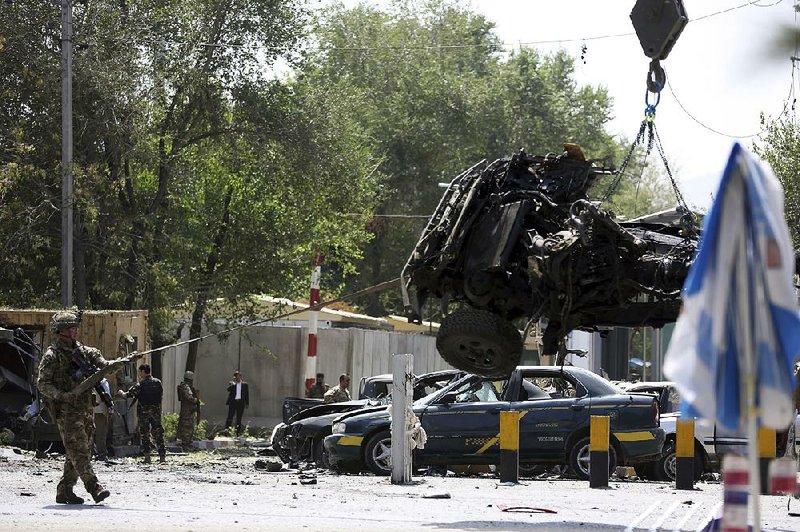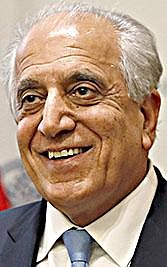President Donald Trump said Saturday that he had canceled a previously undisclosed summit at Camp David with Taliban leadership and Afghan President Ashraf Ghani after the Taliban took responsibility for an attack last week that killed a U.S. soldier.
Trump said the meetings had been set to take place today.
In tweets Saturday evening, Trump wrote that he has "called off peace negotiations" and accused the Taliban of perpetrating the attacks to strengthen their negotiating hand.
"What kind of people would kill so many in order to seemingly strengthen their bargaining position?" Trump tweeted. "They didn't, they only made it worse!"
He continued: "If they cannot agree to a ceasefire during these very important peace talks, and would even kill 12 innocent people, then they probably don't have the power to negotiate a meaningful agreement anyway. How many more decades are they willing to fight?"
Ghani had previously announced that he would travel to Washington. His trip had initially been planned for Saturday, but he delayed the trip for several days.
It remains unclear if the U.S.-Taliban talks are over or only paused.
The State Department and the White House declined Saturday to respond to requests for clarification.
News of the Taliban's once-imminent arrival drew criticism from Rep. Adam Kinzinger, R-Ill., who serves in the National Guard. "Never should leaders of a terrorist organization that hasn't renounced 9/11 and continues in evil be allowed in our great country," he tweeted.
In his tweets, Trump appeared to reference a Thursday morning car bombing that killed two NATO service members, including one American, in a heavily fortified part of central Kabul.
The Pentagon identified the soldier killed as Sgt. 1st Class Elis Angel Barreto Ortiz, a 34-year-old paratrooper from Morovis, Puerto Rico. He is the 16th American service member killed in combat in Afghanistan this year.
The attack, which killed 12 people, came just days after the top U.S. negotiator in the ongoing peace talks with the Taliban had announced that he had reached a deal "in principle." The attack was part of a surge of Taliban violence in recent days in Kabul and elsewhere, leaving scores of people dead.
It is not clear where Trump's abrupt move leaves the larger issue of an end to the longest American war or the return of U.S. forces. The secret summit would have been a step toward ratifying an agreement between the United States and the Taliban.
That deal, months in the making, largely had been handled by veteran diplomat Zalmay Khalilzad. He worked to settle hostilities with the Taliban insurgency and prepare for an exit of all or most U.S. forces.
Khalilzad said recently that he was on the "threshold" of an agreement with the Taliban aimed at ending the war. The president, however, has been under pressure from the Afghan government and some lawmakers who mistrust the Taliban and think it's too early to withdraw American forces.
Khalilzad abruptly returned to Qatar late last week for unexpected talks with the insurgents on the deal that he had described as complete just days earlier. Khalilzad said Monday that the agreement "in principle" to begin a U.S. troop withdrawal only needed Trump's approval.
The terms included the withdrawal of more than 5,000 U.S. troops -- more than one-third of the total in Afghanistan -- in exchange for the Taliban agreeing to sever ties with al-Qaida and to continue its fight against the Islamic State.
The deal also included a Taliban commitment to begin inter-Afghan talks with the Ghani government, expected to start within weeks. The talks themselves would include discussion of a cease-fire.
Trump -- who had long advocated for a U.S. withdrawal from Afghanistan before he took office -- has complained that American forces are little more than "policemen" in Afghanistan and has said that he would finally end the war.
On Friday, Khalilzad met with Taliban lead negotiator Mullah Abdul Ghani Baradar and the commander of U.S. forces in Afghanistan, Gen. Scott Miller, with Qatar's foreign minister present, Taliban spokesman Suhail Shaheen said in a tweet late in the evening. Both Thursday's and Friday's meetings were "positive," he said.
An official familiar with Khalilzad's efforts referred all questions to the White House for comment.
AFGHAN JOURNALISTS SEIZED
Separately, six Afghan journalists, all identified as radio news reporters, were kidnapped by Taliban insurgents Friday while traveling to a media conference in the eastern province of Paktia, according to provincial officials and a Taliban spokesman.
But after a week of deadly attacks by the Taliban, including suicide bombings aimed at high-profile targets in the capital and ground attacks in four provinces, the chief Taliban spokesman said Saturday that the seizure of the journalists had been a mistake and that they would soon be released.
No direct contact has been reported with the missing journalists, and there has been no independent confirmation that they are alive and unharmed.
Hamid Kohestani, the news manager of Radio Killid Group, said Saturday night that he did not know whether the journalists were still in Taliban custody. He said the station in Kabul had not been able to reach its reporter, Khairuddin, on his cellphone.
"We demand the release of our colleagues," he said.
The insurgent spokesman, Zabiullah Mujahid, said in an online statement that "our mujahideen have mistakenly kidnapped" the reporters and that as soon as cellphone contact was made with local insurgent commanders, they would be released. Abdullah Hasrat, a spokesman for Paktia's governor, said officials were "trying to negotiate their release."
The six journalists were described by Afghan media outlets as reporters from four Afghan news stations that broadcast in the Dari and Pashto languages. They were reportedly driving to attend a media workshop when they were abducted in Zurmat, a district of Paktia controlled by the Taliban.
In addition to Khairuddin from Radio Killid, the abductees were identified by ToloNews TV and other media outlets as Abdul Rauf Zaheen from Pashtun Ghag radio, Jamaluddin Ilham from Radio Melma and three staff members of Radio Yaran: Tariq Shah Zaki, Abdul Wahid Wairan and Asadullah Samim.
Initial concerns about the group's safety intensified after the news that Abdul Samad Amiri, a government human-rights advocate traveling from Kabul to the western Ghowr province on Wednesday, had been abducted and shot dead by Taliban fighters in Wardak province, a Taliban stronghold.
Last year, Afghanistan was the deadliest country for journalists, with at least 13 killed, according to the Committee to Protect Journalists in New York. Another press monitoring group said 16 had died. Most of the deaths were TV reporters and camera crews covering bombings and other violence.
Thursday marked the first anniversary of the deaths of two ToloNews staff members in Kabul, reporter Samim Faramarz and cameraman Ramiz Ahmadi, who were killed in a double suicide bombing outside a gym. The Islamic State claimed responsibility. In the past week, murals and shrines were created in the city to commemorate them.
So far this year, one Afghan journalist has been killed by insurgents. On Jan. 5, Javid Noori, a radio host and regional government employee, was shot dead by Taliban fighters who stopped and searched a bus at a roadblock in the western province of Farah. He was separated from the other passengers and shot. The Taliban later said they had executed "an enemy officer."
In June, the Taliban issued a threat to Afghan news outlets, saying they would be attacked unless they stopped broadcasting government "propaganda" against the insurgents within a week.
Information for this article was contributed by Seung Min Kim, Anne Gearan, Karen DeYoung, Pamela Constable and Sharif Hassan of The Washington Post; and by Jonathan Lemire and Deb Riechmann of The Associated Press.
A Section on 09/08/2019

